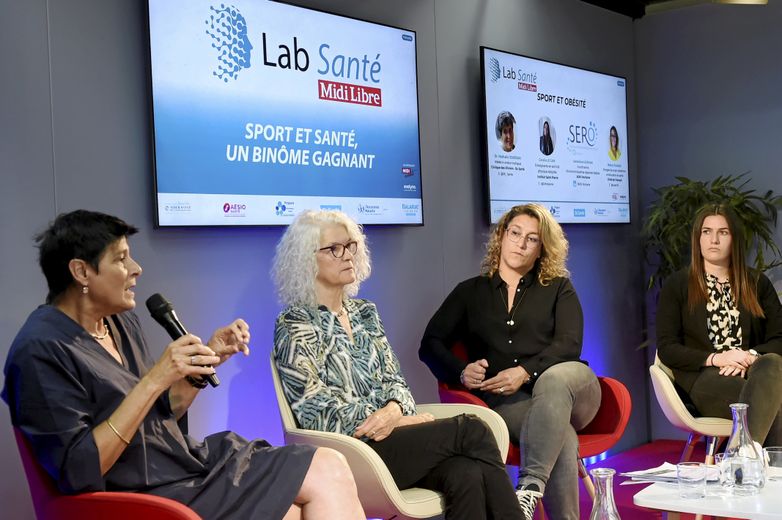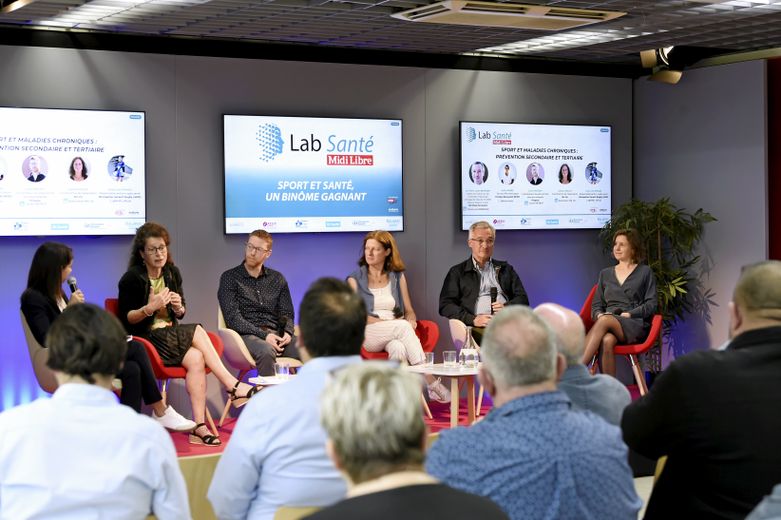“Before, a knockout meant nothing”, Fulgence Ouedraogo testifies at the Midi Libre Health Lab
Sport and health, this was the theme on the menu of the Health Lab on Wednesday May 22, at the Midi Libre headquarters. Alongside Fulgence Ouedraogo, former French rugby international and distinguished guest, several specialists led discussions to explain the benefits of sport to combat certain pathologies or health problems.
The most anticipated meeting of the morning, Fulgence Ouedraogo, former French rugby international, discussed the health of high-level athletes alongside Marc Julia, doctor at Creps de Montpellier and sports doctor at Montpellier University Hospital. , and Stéphane Cade, cardiologist at the Millénaire clinic.
For the former Montpellier Hérault Rugby player, now responsible for developing the identity and brand of the MHR, sport served to build the man he ;he became.
"I was adopted and arrived in Montpellier at 3 years old. Thanks to sport, I have the place I have today in society, he explained. It is often said that you need to do sport to stay healthy, but paradoxically, I owe my health concerns to sport". And make a list: "Today, I have osteoarthritis problems in my hips and ankles, I have had shoulder surgery several times, several fractures, repeated sprains" .
"There is no such thing as players who play without the slightest pain"
A test of the body that Marc Julia and Stéphane Cade approach differently. "As a sports doctor, I have regular, almost daily monitoring of athletes, specifies Marc Julia. In rugby, we see that players who play without the slightest pain do not exist. Fulgence played a Top 14 final with a broken hand. In athletics for example, the slightest injury stops everything. We, doctors, are guarantors of this physical state of athletes". Stéphane Cade, cardiologist, takes on more of a “technical control” role. "When they come to see us, athletes have this fear that the cardiologist will find something that will put an end to their career, he says. We intervene more occasionally with electrocardiograms or stress tests. But what we see is that the more we do sport, the more we keep pathologies at bay, in general".
Mentalities that are evolving in the right direction
Overall, Fulgence Ouedraogo believes that the health of high-level athletes is being taken more and more seriously. In rugby in particular, drastic measures have been taken regarding concussions.
“When I started, a knockout didn't mean anything. A slap on the back of the head, a little water, and we were off again, he smiled. Now you can be arrested for three months for that. It was hard to imagine at first, but it’s going in the right direction. We think about brain scarring, and that’s new. In any case, if rugby remains a sport with permanent danger, it will be difficult to gain licensees, and we understand that ".
For Marc Julia, we must keep in mind that a concussion only gives rise to a loss of consciousness one time in ten. "Evil can be present without being visible. In any case, if the brain hits the skull, that poses a problem. Rugby is greatly affected, but so are board sports, particularly because of falls", he adds.
Round table 3:
Obesity, a major public health issue of the 21st century

A shared observation: early care and activity. Midi Libre – SYLVIE CAMBON
In France, one in six children is affected by overweight or obesity. This data varies according to social criteria. "The obesity rate is twice as high in disadvantaged areas, develops Geneviève Le Bihan, coordinator of the regional Obesity expertise structure at Sero Occitanie. And the health crisis has absolutely not helped that".
For her, obesity is "a form of pandemic, since it affects one in eight people in the world. This is a major public health issue because obesity discriminates". Pediatric obesity is closely studied. The mother's weight, weight gain during pregnancy, if there has been gestational diabetes, are all determining factors to take into account. And to complete: "The earlier we take care of a child, the more chance we have of reversing the curve".
Resume an active lifestyle
For her part, Nathalie Jourdan, endocrinologist at the Oliviers clinic, thinks that National Education also plays its role: "All this falls within the framework of prevention. With the Olympic Games, we have this movement of 30 minutes of sport per day which is followed by many schools, it's a good start".
On the CPAM side, actions are put in place to help children suffering from obesity and overweight. "A system recently made it possible to improve the situation of 52% of the children monitored, and 82% changed at least one eating habit. It’s quite an education,” judge Malory Planas, prevention project manager at the CPAM of Hérault.
Coralie Le Cam, adapted physical activity teacher at the Saint-Pierre Institute in Palavas-les-Flots, notes that patients are arriving earlier and earlier within the structure. "We offer any type of activity, as long as it’s fun", she adds.
Round table 2:
Sport to fight chronic diseases

Discussions around the benefits of the movement. Midi Libre – SYLVIE CAMBON
Sport can also have a role to play in the treatment of chronic illnesses. "Today, physical activity, provided it is supervised, is recommended for these pathologies", believes Pierre- Louis Bernard, lecturer at the UFR Staps.
"In addition to saying that sport is beneficial, now we can say at what dose, at what intensity, and at what frequency", adds Julien Metrot, coordinator of the center adapted physical activity at Propara.
Sylvie Fabre, rheumatologist at the Beausoleil clinic, notes that her patients have significant apprehension about physical activity. "People suffering from rheumatoid arthritis receive a real hammer blow when they understand that they can no longer do everything they did before, she says. I have patients who burst into tears because of this. Movement always brings benefits. Even walking your dog is excellent". In the context of supporting a chronic illness, Julien Metrot notes an evolution in care: "Before, we were content to distribute brochures, and we thought the job was done. Now it takes time."
In Occitanie, different systems exist to support patients suffering from chronic illnesses. "We can cite Occitan’air, the Heart and Health clubs or even France Parkinson", list Isabelle Pollet, coordinator of the ;Ma Vie association. Since 2016, the MHR has also launched a health rugby section which supports patients affected by cancer, in order to practice adapted rugby. "Of course, the feedback is very positive, we have a desire to open up to other pathologies as we see a great evolution in what we has already put in place", specifies Anne-Lise Poinas, head of the section.
Round table 1:




